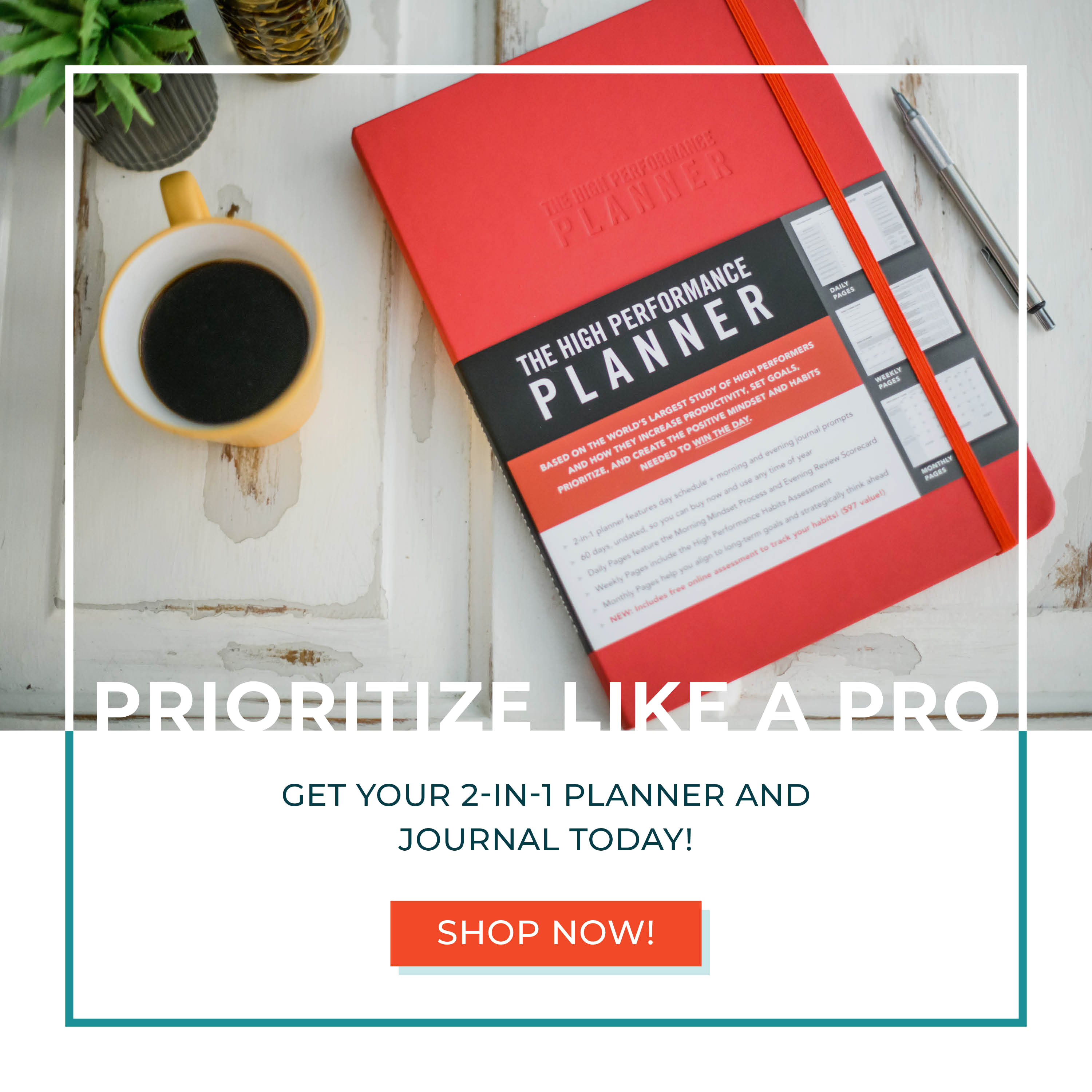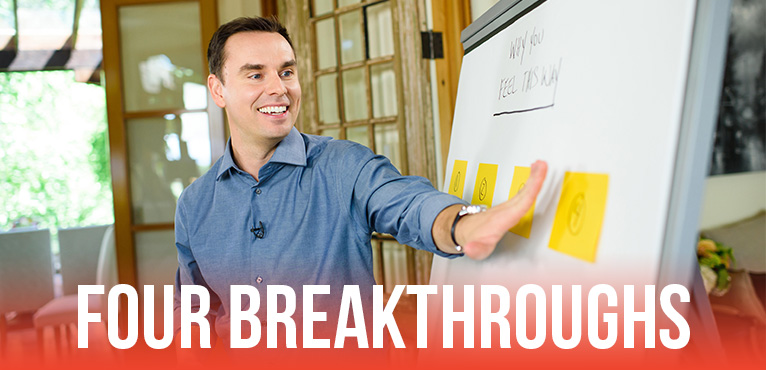SUMMARY
- “Let’s be strategic in leaving the wrong thing so things are left well so that you don’t have a lot of shame and regret there.”
- Sometimes it’s best to cut ties with a project, dream, or relationship, while other times a breakthrough is right around the corner and quitting is the last thing you should do. In this episode, discover how to discern whether to quit or continue, so that you can activate resilience when it’s the right thing to do.
- “We have to figure out elegant ways to move through difficulties.”
- If you do decide to quit, don’t burn bridges on your way out. Be the bigger person so that you have support with you no matter where you end up in life.
- Watch the video to get the full training.
- Already have the High Performance Planner and CRUSHING each and every day? Let’s celebrate you! Take a photo with your planner and use #GrowthDay so we can find you on social media!
HOT NEWS & DEALS!
-
Get the Confidence Masterclass
Stop letting limiting beliefs and lack of confidence hold you back! Learn the SKILLS of confidence from 9 of the world’s best personal development experts in the most comprehensive Confidence training ever created! $400 worth of training – just $7.99 today! Get the Confidence Masterclass!
-
Get the GrowthDay app!
Make self-improvement a way of life and get the GrowthDay app! GrowthDay features all your personal development tools, coaching and community in one place. Write your journal, track your habits, take wellness challenges, watch live influencers teaching new life strategies, and join a global community of positive and supportive high achievers excited to improve their lives! Get the app on Apple app store here. Get on Android here. Get desktop here.
DID YOU KNOW?
I give weekly prizes, gratitude and shout-outs to our students, so post a screenshot or video on Instagram and use #TheBrendonShow! I can’t wait to hear your thoughts about this episode!
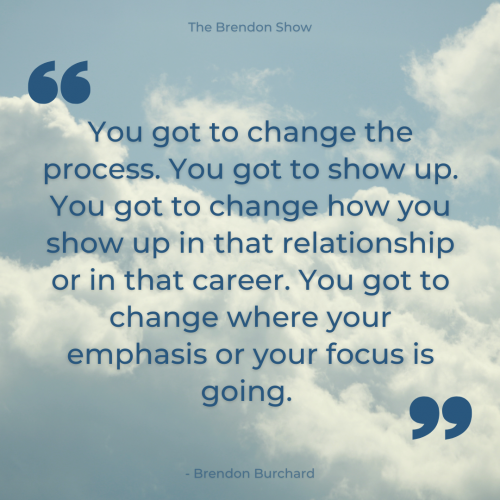
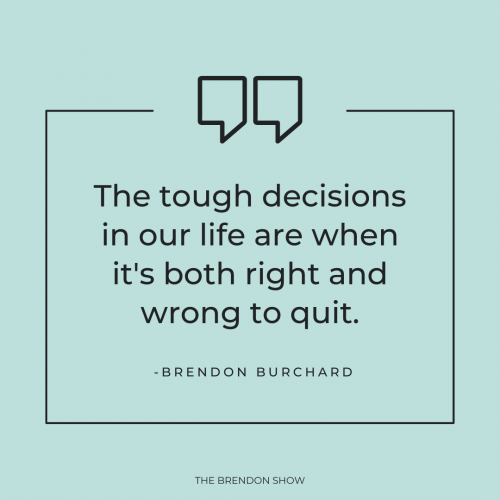
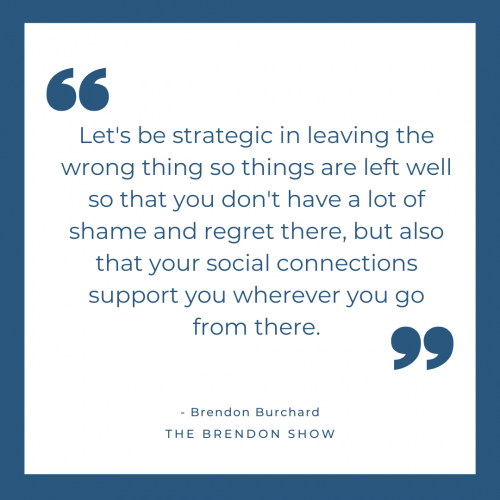
FULL TRANSCRIPT
[The following is the full transcript of this episode of Motivation With Brendon Burchard. Please note that this episode, like all episodes, features Brendon speaking extemporaneously–he is unscripted and unedited. Filmed in one take, Motivation With Brendon Burchard has become one of the most viewed unscripted, direct-to-camera self-help series in the history of YouTube. It has also been the #1 Podcast in all of iTunes and is regularly in the top podcasts in the Self-Help and Health categories around the globe. Subscribe to the free motivational podcast on iTunes or Stitcher.)
1. Origin
If you’re thinking of quitting something, I want you to diagnose what we call the O.O.P.S. Diagnose the O.O.P.S. It’s an acronym like, okay, you, you bet on the wrong thing. You’re in the wrong place. You’re thinking of quitting. O.O.P.S. Made the wrong decision. Chose the wrong partner. Took the wrong opportunity. O.O.P.S. You know, okay, O.O.P.S is a framework we’re going to go through that we would just kind of try to figure out. Oh, okay, what’s going on here? As a coach so I can get some more information and I’ll go to the conversation of relationships because I think that’s the most common thing I get is like, either want to quit my relationship or my marriage or I want to quit, you know, this job or career. I’ll use those examples because they’re very often convenient as metaphors. So, number one, is the origin. Okay, you think about leaving this marriage. Tell me, why did you pick this person in the first place? Can you take me back? Help me. Help me understand. What was it about this person that made you want to be in a relationship with them? You know, what was the origin? Just going back to the original decision, the original commitment point, we often call it in coaching. What was that original commitment point that locked you into this relationship or locked you into this career? Like, why did you start the thing, do the thing, try the thing?
Okay, we’ll have that conversation. And I encourage you if you’re really – if you’re in a place where you’re actively thinking about leaving a relationship or career or something, like why did you start that? You know, if it’s a job, why did you take the job? What was it about the job? What were the elements or the excitement, the passion, the interest? What was there that you accepted that job or career or started that new dream? Because just – like rekindling or remembering where that commitment was and why it happened. Sometimes you go, oh yeah, that’s what I – okay, that’s what I was after. That’s a person I want to be connected with.
2. Outcome
The second thing is, what is the outcome you hope for? Okay, the outcome. That might be, for example, in the job category, you might say, well, you know, I wanted to have a nine to five where I just felt like, you know, I was applying my interest, I was being challenged, I was contributing something on a regular basis. Okay. Because maybe some of those things aren’t there right now, but maybe you can change how you show up at work. You can ask for new responsibilities, and maybe the job’s right, but the outcomes aren’t happening yet. And often when the outcome isn’t there, but they’re in the right relationship with the right job, they strategically chose it. Oh, let’s adjust our approach. Let’s try some new tactics and habits to see if can we get that outcome there before we quit the thing. I’m always asking myself if can we get the outcome you’d hoped for before I quit it. Right? That is that trial and error process we’re going to talk a lot about like, hey, I’m okay with anyone quitting anything. I just don’t like when they quit it too soon. Does that make sense? If it’s the right thing, I don’t like when they quit too soon.
If it’s apparently obviously the wrong thing, listen, we don’t even need to have that conversation because you already know what to do. When it’s the awful, wrong, terrible thing, that’s the easy decision. The tough decisions in our lives are when it’s both right and wrong to quit. You know, you can make – you can draw that line down the page and go, well, it could be either one. Well, that’s why I wanted to revisit what was the outcomes you would hope for there.
3. Process
Next up, process. What did you hope or think it would be like on a daily or a weekly basis, you know, and what are you doing currently in that relationship with that opportunity? Processes mean like what’s life really like? Like entrepreneurs, let’s say you start a big dream, right? And you think, well, I thought, you know, the process would be I could just create content on social media every day. And then you realize, oh, well, the process actually is, you know, running and managing the business and, you know, making money and filling out a lot of forms and doing your taxes and hiring people. And you learn all these processes – you didn’t anticipate that that’s part of the process. And the process doesn’t feel good. Many people in their careers, for example, they’re in a career doing something Monday to Friday that they don’t enjoy. Probably the right company, and probably the right career. But what they’re doing Monday to Friday isn’t the right slot. And what we need to do is not quit a decent job if they like it. What we need to do is go, we need to change what we do here. We need to adjust your role or your responsibilities within a good career so we enjoy your Monday through Friday. Does that make sense?
And it – and a lot of people don’t try that. They just go, this job sucks, I’m leaving. But they haven’t made the attempt to adjust their process or how they show up towards their outcome or to a new process within the frame. Same thing in your relationships, right? Oh, every day it’s the same old thing. Get up, make the kids some food for some breakfast and some lunch, drive them to school, go to work, come home, eat dinner, watch a show and go to bed. And you’re like, Oh my God, this is every day. Well, you know, you got to change the process. Wait, you don’t have a date night? Wait, in your process, you’re not going on vacations together? Wait, in your process, you’re not debriefing the week, you’re not planning the weeks together? Wait, you’re not making sure that you’ve ensured there’s time for fun? Well, you’re not quitting the relationship.
You just don’t like the process? You’ve got to change the process. You got to show up. You got to change how you show up in that relationship or in that career. You got to change where your emphasis or your focus is going.
4. Social Connection
The last big idea here on the O.O.P.S is the social connection. You know, most people don’t realize that a vast majority of the major decisions in their life were not psychology, it was sociology. They made a decision because they hope to have a specific type of connection with somebody. Right? That’s from the relationships we choose to the neighborhoods we choose, to the schools we choose, to the companies we go to work for. Right? People always say you don’t go to work for a job at a company, you go to work for a company because you like the culture, right? If you choose a company for its culture, that’s a social connection expectation, isn’t it?
But for a lot of people there – the most amount of discouragement and quitting comes from the expectation-related social connection.
5. Be the Bigger Person
If you’ve been with me for a long time, you know, in our High Performance research, it’s super clear that most people quit their job because of the discouragement and disempowerment that they sense with their first line manager, meaning the person that they report to. That relationship is not what they wanted it to be. They feel disempowered, not heard, not understood, and not respected. They’re not getting opportunities from that person. They don’t think they’ll ever be able to rise up beyond that person. That person’s going to hold them down or that person’s just a jerk. And because of that one person, they leave a whole company. Think about that. This is 70% of people who quit a job. It’s related to their relationship with the first-line manager. 70% of people leave a company because of one person. A relationship with one person. Think about that. Think about that for a minute. Billions of workers around the world, 70% are going to leave because of that one relationship. That company might have 100,000 people in it, but they’re going to leave because that one social connection didn’t give them what they want. And this is where the High Performance coach, I would say, okay, so there’s one pain in the butt at work. You’re going – but you like the company, you like the mission. There are other humans there working, too. You’re going to quit because of that person? Now, sometimes it makes sense, right? Again, this is not me trying to make the decision for you. I’m just trying to go, how do we insert some perspective here? So again, I’m fine if you’re like, no, this is definitely the wrong thing. If I’m great then let’s be strategic in leaving the wrong – wrong thing.
Let’s be strategic in leaving the wrong thing so things are left well so that you don’t have a lot of shame and regret there, but also that your social connections support you wherever you go from there.
Does this sometimes require you to be the bigger person? Nine out of ten times? Why are you complaining about that? Drives me crazy when people go, this sucks I have to be the bigger person. I’m like, good for you! What relationships do you want to be in? Do you want to be the lesser person? No. Good for you and your character and your integrity that you want to leave things well, do things well, and play the higher moral game than being dragged into the pits. Good for you. That’s what makes you a leader. That’s what makes your opportunities in the future better. That’s what you can bank on when you go to bed at night and you have a dream that you know you will show up and show up well with high integrity and values and character.
Where do we lose that conversation in the world? Well, we lost the conversation in a social media, selfish world, where we don’t talk about servant leadership anymore. We don’t talk about civics anymore. We don’t talk about, you know, respect anymore. And so now it’s just about me, me, me, me, me, me, me, me. And people wreck a lot of relationships and businesses because, you know, they’re willing to go into the pits and fight dirty and be awful and terrible and that stuff catches up with you. I know you want to fight. I know you want to quit. I know you want to burn everything in the fire and get the hell out of there. And I also know what your goals are in the future. And if you wreck everything here, you know what’s hard to do? Build upon wreckage. Do you all ever realize that? You ever wreck a relationship so much that you are wrecked for years? I’ve been there. Right?
We have to figure out elegant ways to move through difficulties.
And I could go off on this one for a really long time, so let me just pause there. I’m going to have a conversation with the client about what was the O.O.P.S? Why did you choose to get in there? What were the outcomes you hope for? What’s the process you expected? What’s the relationship to the social connections you desired?
